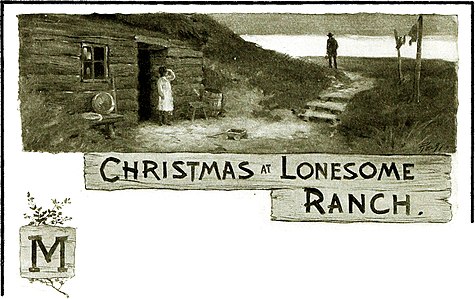
By Anna E. S. Droke.
ary Ellen stood in the doorway, shading her face with her hands. Her face wore a faraway look, and she had ceased to watch the figure disappearing in the distance.
Mary Ellen's face frequently wore that look when she had a problem on her mind—and she usually had one. The problem of getting something out of nothing was ever present in some one of its varied phases; but to-day it was more than usually vexing, because Mary Ellen had fully made up her mind that something real had got to happen, She had been content with pretending just as long as she was going to, she told herself; and this time the twins were going to have something real for Christmas—something bought. How she was going to buy it was the yet unsolved question.
Just now her spirits were unusually low; for ever since her father had told her, on Saturday evening, that he had work for possibly two weeks repairing some barns at Fairview Ranch, she had been gathering courage to ask him if she might have a little—one dollar if possible, fifty cents at least—to buy something for Charlie and Charlotte, the twins, who did not remember Christmas in their Eastern home and could not understand why Santa Claus, of whom Mary Ellen never tired of telling them, never found his way to their lonesome dugout.
And now she had asked him, and he had said: “I ‘mm so sorry to disappoint you, little daughter; but we must have flour and fuel, and we all need shoes. It may be a long time before another job comes my way.” Then he kissed her and started to his work, with many misgivings at leaving his children alone until Saturday night; but the time consumed in going back and forth each day would mean extra hours with extra pay.
Nothing more dangerous than coyotes would be likely to visit them, and Mary Ellen would take care of them. Yes, Mary Ellen was a very capable child, John Morton told himself as he strode over the plains toward Fairview Ranch, five miles distant.
Poor Mary Fllen! Everybody who saw her said, “Poor Mary Hen!” She was thirteen, but small fer her age. She had never had time to grow—so people said. She was nine, and in the fourth grade at the district school, when she climbed up beside her father on the high seat of the bright new prairie-schooner, four years ago, and set out from her home in Indiana for the great West.
John Morton was a carpenter owning a little cottage and earning a fair living in the little Indiana town; but the desire to own a farm was upon him, so he sold his little home and, buying an outfit, set out for the unknown land.
“We will go on to the irrigated country,” he said. So into the great Arkansas valley, in southern Colorado, he took his way, homesteading a quarter-section in what seemed destined to be a promising location, Lumber for even258
